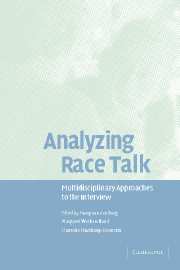Book contents
- Frontmatter
- Contents
- List of contributors
- Preface
- Acknowledgments
- Transcriptions symbols
- Introduction
- 1 Racism and the analysis of cultural resources in interviews
- 2 Analyzing racial discourse: the discursive psychology of mind–world relationships
- 3 Constructivist processes in discourse: a cognitive linguistics perspective
- 4 Institutional, professional, and lifeworld frames in interview talk
- 5 The uses of absurdity
- 6 Multiple voices in talking race: Pakeha reported speech in the discursive construction of the racial other
- 7 Contradictions in interview discourse
- 8 Racism, happiness, and ideology
- 9 The frame analysis of research interviews: social categorization and footing in interview discourse
- 10 Affiliation and detachment in interviewer answer receipts
- 11 Interviewer laughter as an unspecified request for clarification
- 12 Perspectives and frameworks in interviewers' queries
- Appendix: Interview transcripts
- Index
10 - Affiliation and detachment in interviewer answer receipts
Published online by Cambridge University Press: 22 September 2009
- Frontmatter
- Contents
- List of contributors
- Preface
- Acknowledgments
- Transcriptions symbols
- Introduction
- 1 Racism and the analysis of cultural resources in interviews
- 2 Analyzing racial discourse: the discursive psychology of mind–world relationships
- 3 Constructivist processes in discourse: a cognitive linguistics perspective
- 4 Institutional, professional, and lifeworld frames in interview talk
- 5 The uses of absurdity
- 6 Multiple voices in talking race: Pakeha reported speech in the discursive construction of the racial other
- 7 Contradictions in interview discourse
- 8 Racism, happiness, and ideology
- 9 The frame analysis of research interviews: social categorization and footing in interview discourse
- 10 Affiliation and detachment in interviewer answer receipts
- 11 Interviewer laughter as an unspecified request for clarification
- 12 Perspectives and frameworks in interviewers' queries
- Appendix: Interview transcripts
- Index
Summary
Interviewer's conflicting interactional tasks
The interviewer in research interviews on ethnic and racial relations faces potentially conflicting interactional tasks with regard to the interviewees and the topics of the interview. The interviewer aims to have the interviewees express themselves on issues where disagreement and conflict are around the corner, even between interviewer and interviewee. On the one hand, the interviewer may want to create an atmosphere of confidence in which the interviewee feels free to express possibly controversial views, while on the other hand the interviewer as a person holds views on the interview topics that may not be in agreement with those expressed by the interviewee. The potential interactional conflict that arises from this is that the interviewer may want to establish an interpersonal rapport with the interviewee without identifying at the same time with the views the interviewee expresses. In this paper I will argue that this interviewer problem is particularly precarious since one of the discursive means to establish interpersonal rapport is precisely a content-oriented affiliation with the other's prior contributions.
I will discuss three open interviews on ethnic identity and ethnic relations in New Zealand and be concerned with one aspect of the interview as a reciprocal activity; namely, the ways in which the interviewer responds to the answers given by the interviewee.
Information
- Type
- Chapter
- Information
- Analyzing Race TalkMultidisciplinary Perspectives on the Research Interview, pp. 178 - 199Publisher: Cambridge University PressPrint publication year: 2004
Accessibility standard: Unknown
Why this information is here
This section outlines the accessibility features of this content - including support for screen readers, full keyboard navigation and high-contrast display options. This may not be relevant for you.Accessibility Information
- 2
- Cited by
